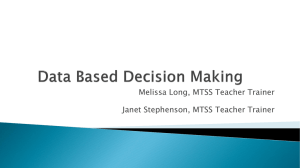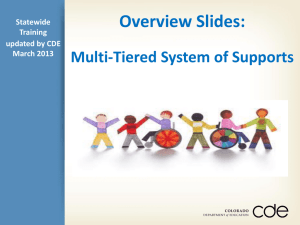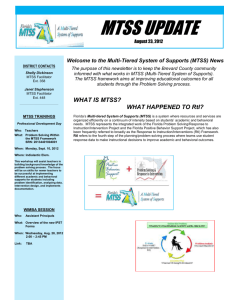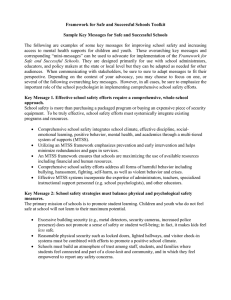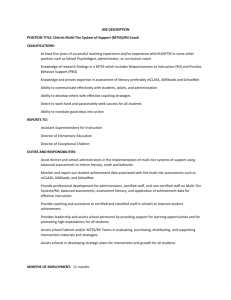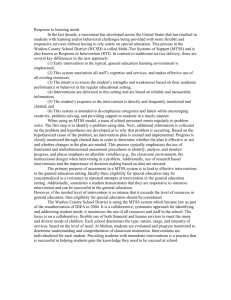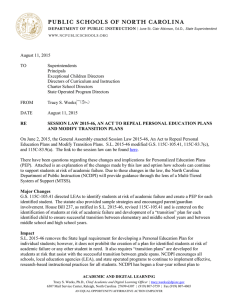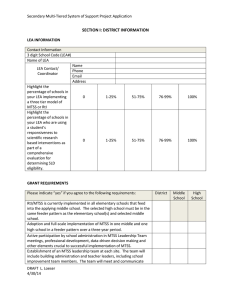Document 10910069
advertisement
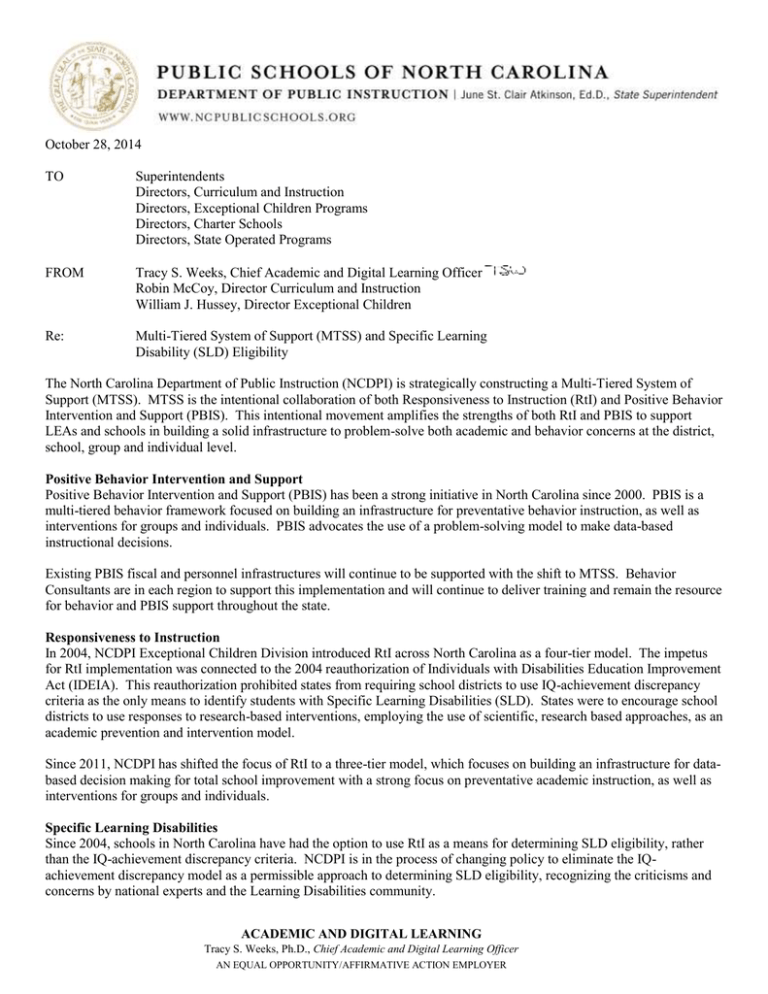
October 28, 2014 TO Superintendents Directors, Curriculum and Instruction Directors, Exceptional Children Programs Directors, Charter Schools Directors, State Operated Programs FROM Tracy S. Weeks, Chief Academic and Digital Learning Officer Robin McCoy, Director Curriculum and Instruction William J. Hussey, Director Exceptional Children Re: Multi-Tiered System of Support (MTSS) and Specific Learning Disability (SLD) Eligibility The North Carolina Department of Public Instruction (NCDPI) is strategically constructing a Multi-Tiered System of Support (MTSS). MTSS is the intentional collaboration of both Responsiveness to Instruction (RtI) and Positive Behavior Intervention and Support (PBIS). This intentional movement amplifies the strengths of both RtI and PBIS to support LEAs and schools in building a solid infrastructure to problem-solve both academic and behavior concerns at the district, school, group and individual level. Positive Behavior Intervention and Support Positive Behavior Intervention and Support (PBIS) has been a strong initiative in North Carolina since 2000. PBIS is a multi-tiered behavior framework focused on building an infrastructure for preventative behavior instruction, as well as interventions for groups and individuals. PBIS advocates the use of a problem-solving model to make data-based instructional decisions. Existing PBIS fiscal and personnel infrastructures will continue to be supported with the shift to MTSS. Behavior Consultants are in each region to support this implementation and will continue to deliver training and remain the resource for behavior and PBIS support throughout the state. Responsiveness to Instruction In 2004, NCDPI Exceptional Children Division introduced RtI across North Carolina as a four-tier model. The impetus for RtI implementation was connected to the 2004 reauthorization of Individuals with Disabilities Education Improvement Act (IDEIA). This reauthorization prohibited states from requiring school districts to use IQ-achievement discrepancy criteria as the only means to identify students with Specific Learning Disabilities (SLD). States were to encourage school districts to use responses to research-based interventions, employing the use of scientific, research based approaches, as an academic prevention and intervention model. Since 2011, NCDPI has shifted the focus of RtI to a three-tier model, which focuses on building an infrastructure for databased decision making for total school improvement with a strong focus on preventative academic instruction, as well as interventions for groups and individuals. Specific Learning Disabilities Since 2004, schools in North Carolina have had the option to use RtI as a means for determining SLD eligibility, rather than the IQ-achievement discrepancy criteria. NCDPI is in the process of changing policy to eliminate the IQachievement discrepancy model as a permissible approach to determining SLD eligibility, recognizing the criticisms and concerns by national experts and the Learning Disabilities community. ACADEMIC AND DIGITAL LEARNING Tracy S. Weeks, Ph.D., Chief Academic and Digital Learning Officer AN EQUAL OPPORTUNITY/AFFIRMATIVE ACTION EMPLOYER NCDPI is embarking on a 5 year phase out plan for this elimination. The timeline for this change is: February 2015: Public notice and comment on proposed policy changes to NC Policies Governing Policies for Children with Disabilities June 2015: Present proposed policy changes to the NC State Board of Education approval 2015-2016: Training and support for the use of data from a student’s responsiveness to research-based instruction and intervention data for SLD 2020-2021: All NC public schools use a student’s responsiveness to research-based instruction and intervention data for SLD eligibility decisions at grade K-12. Multi-Tiered System of Support RtI and PBIS utilize a systems approach to problem-solve for all, some and few students. The infrastructure of both models is designed to create a data-driven multi-tiered system of support. When combined, districts and schools will have a solid foundation to implement a full continuum of social, emotional, behavioral and academic supports for all students. MTSS statewide rollout will focus on building a solid infrastructure for creating the continuum of academic and behavior supports, including the needed structures for SLD eligibility decisions. Four MTSS Consultants have been hired and regionally placed to support the implementation of MTSS in each LEA, including the shift in SLD eligibility. These consultants will work collaboratively with other regional consultants to assist LEAs in building a full continuum of academic and behavior supports. NCDPI MTSS Leadership and Policy Team, as well as the strategic planning groups have constructed the definition, vision and mission for MTSS. NC MTSS Definition: NC MTSS is a multi-tiered framework which promotes school improvement through engaging research-based academic and behavioral practices. NC MTSS employs a systems approach using data-driven problem-solving to maximize growth for all. NC MTSS Vision: Every NC Pre K-12 public education system implements and sustains all components of a Multi-Tiered System of Support to ensure college and career readiness for all students. NC MTSS Mission: NCDPI will prepare and support LEAs to implement a Multi-Tiered System of Support for total school improvement by providing professional development, coaching and technical assistance, research and evaluation, and communication and visibility that result in college and career readiness for all students. NCDPI believes MTSS is the most effective and efficient approach to improving school outcomes and student performance thereby ensuring equitable access to a sound basic education. Please contact Amy Jablonski at amy.jablonski@dpi.nc.gov with questions regarding MTSS, Lynne Loeser at lynne.loeser@dpi.nc.gov with questions regarding SLD eligibility and Laura Winter at laura.winter@dpi.nc.gov with questions regarding PBIS. TSW/RM/WJH/rk c June St. Clair Atkinson, State Superintendent Rebecca Garland, Deputy State Superintendent Amy Jablonski, MTSS State Transformation Specialist Lynne Loeser, Consultant, LD/ADHD Consultant Laura Winter, Communications Consultant
